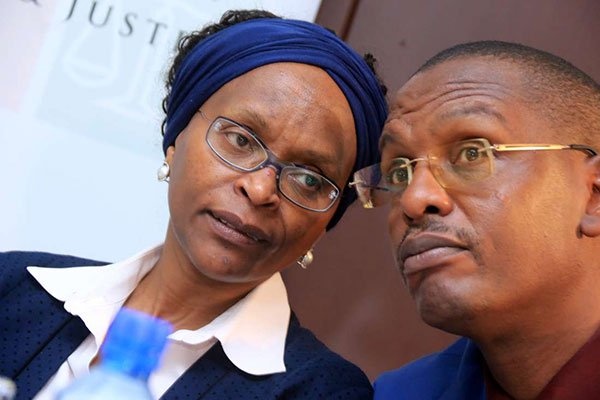The electoral commission is on the spotlight over its preparedness to hold credible elections with only 19 days to go even as it insists it is ready for the exercise.
A second edition of a report dubbed “Ready or not?” that assesses pre-election readiness of the country, says the Independent Electoral and Boundaries Commission (IEBC) is time barred and needs to move with speed on key and critical issues touching on Presidential ballot papers, voter register, electronic relaying of results and efficiency of its electronic voting kits.
The report released on Tuesday in Nairobi was prepared by the Africa Centre for Open Governance (AfriCOG) and Kenyans for Peace with Truth and Justice (KPTJ).
In the report, the two lobbies demand that the commission publicly tests electronic system technology that will be used during the voting day.
POSTPONE ELECTIONS
The testing, they said, should include simulations of what will happen if the system fails. It also demands that IEBC publishes voters’ register, which should have been done 30 days before the election.
Already, the Opposition, National Super Alliance (Nasa), has moved to court over the matter, accusing IEBC of failing to ensure there is complementary technology to act as backup during the elections as required by the law
During the hearing of the case at the High Court, the Opposition said it wants the election postponed should the electronic system fail on polling day.
But IEBC CEO Ezra Chiloba said that in the biometric voter identification in the May-June verification of register, the 45,000 KIEMS (Kenya Integrated Election Management System) kits registered a 98.8 per cent accuracy.
NETWORK PROBLEMS
The kits, he said, will be continuously tested specifically, three days to the election.
Mr Chiloba added that to ensure the smooth electronic transfer of results, the commission is working closely with three mobile network providers to expand their network.
In remote areas that are not covered by the telecommunication firms, satellite technology will be used.
“We have mapped close to 92 per cent of the country. This will ensure that all results are transmitted electronically. In the likely event there is network outage we will move to a place that is covered to relay the results,” Mr Chiloba said.
COMPLEMENTARY MEASURES
He added: “All through, our tests and during the verification exercise itself, the performance on biometric verification by the kits was 98.8 per cent accuracy which is different from 2013.”
In the event that voter’s details are not retrievable from the Kiems through biometric means due to various reasons, he explained, IEBC has put in place complementary measures embedded in the system.
“We will run an alphanumeric search in the Kiems’ complimentary voter identification register. If this also fails we will use the printed register after inviting agents representing political parties.
“There will be records showing how many people were identified using alternative mechanisms. Given these procedures we expect a minimal number of such individuals being identified as such on the polling day,” he said.
DIRECT PROCUREMENT
Mr Chiloba said the commission will this week publish the voter register for public inspection, but with truncated information in regards to ID Numbers and voter’s images due to privacy reasons.
On the presidential ballot papers crisis, Mr Chiloba said the commission was considering direct procurement should the Court of Appeal not rule in their favour in the case where the High Court nullified the tender awarded to Al Ghurair Printing and Publishing LLC, o grounds that there was no public participation.
IEBC was directed to come up with a mechanism for public participation even as the firm prints the ballot papers for the other elective seats.
“There are conditions that justify that process. We have explored options and we have a basis as to where we could go when it comes to direct procurement. We can justify the identification of a company,” he said.
IMMEDIATE ATTENTION
He added: “We are already thinking ahead of the Court of Appeal ruling. In the real sense we are not waiting for the Court of Appeal decision. This is the first time in public procurement that public participation is being demanded of public entities. It’s an experiment on the wrong specimen, the IEBC, a few days to the election.”
The report further cites increased voter education and post-election dispute resolution as some of the issues that need immediate attention by the commission to ensure a free and fair election.
On voter registration, it recommends that the commission publicizes the pre-audit voters’ register data at all levels so that independent observers can understand the changes.
Most importantly, the Civil Registration Department has been asked to investigate why many deaths, which were previously captured in the IEBC voter register but later removed, go undocumented.
“The Civil Registration Department must also create and maintain a system through which it sends IEBC updated data on a regular basis so that the register of voters can stay updated,” it says.
